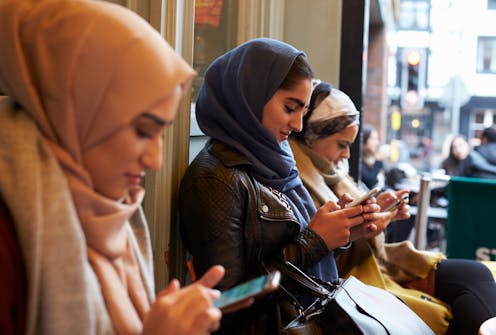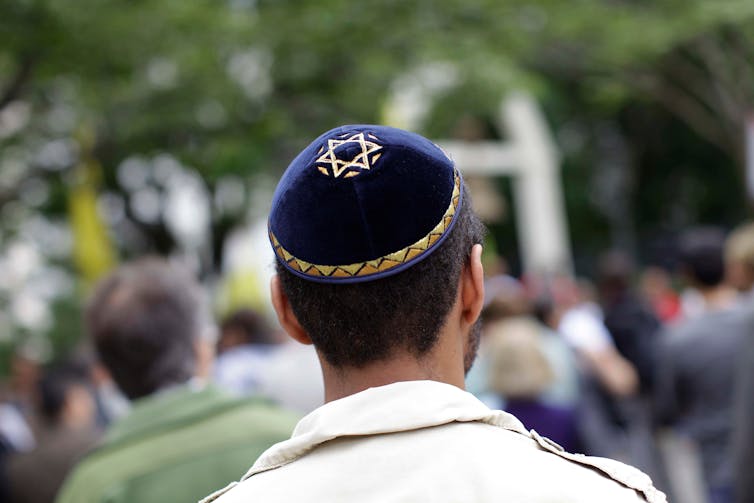
Religious hate crimes in England and Wales are at record levels. New Home Office statistics reveal that although hate crime overall saw an annual decrease of 5% in the year to March 2024, there was a 25% increase in religious hate crimes.
Hate crimes against Jewish people more than doubled from the previous year, making up 33% of religion-based hate crime in the new figures. Those against Muslims rose by 13%, making up 38% of the total.
There was a sharp increase in reported incidents against both Jewish and Muslim people after the Israel-Hamas conflict began in October 2023. While the total number of offences has since declined, it is still higher than before the conflict began.
These figures reflect police-recorded hate crime, but other organisations also track these incidents. The organisation Tell Mama, which tracks anti-Muslim hate, recorded a 335% increase in cases in the months after October 7 2023 compared to the year before. And the Community Security Trust tracked a 147% rise in anti-Jewish hate in 2023 compared to 2022. Of these incidents, 66% were on or after October 7.
The October 7 attacks are an example of a trigger event that usually precedes a spike in hate crime. These events can “galvanise tensions and sentiments against the suspected perpetrators and groups associated with them”.
Trigger events can be one-off events or last only a short period of time, but the continuing high levels of hate crime that the UK has seen over the past year is still likely due to the ongoing situation in the Middle East.
These trends had been increasing worldwide, and not only since the latest conflict. A UN report in 2021 found that Islamophobia had reached “epidemic proportions”. Additionally, as my colleagues and I have found in our research, such racism is also experienced by a diverse range of ethnic groups and not only Muslims. A rise in antisemitism has been recorded around the world too.
Unreported hate
Not only are the latest statistics in the UK alarming, they are only the tip of the iceberg. As my work on the inquiry into Islamophobia in Scotland found, many incidents go unreported.
We found that many did not report incidents due to concerns about institutional racism in the police and a lack of confidence in policing and in the criminal justice system. Added to this were worries about not having enough evidence, the incident not being “serious enough”, and fear of reprisal. Some even felt that it happened so often that there was “no point” in reporting it.

The long-term impacts of hate crime are deeply concerning. Victims who experience constant discrimination are likely to experience poor health outcomes and premature ageing.
The rising numbers also promote a culture of fear that can discourage members of ethnic or religious minority groups from participating fully in society. My colleagues and I have found in our research that Islamophobia and prejudice has stopped some Muslims from participating in politics and going out to socialise.
Encouragingly, however, others chose to become more active in their communities in order to challenge stereotypes about Muslims.
Making prejudice mainstream
In addition to the trigger event of the Israel-Hamas war, there are a number of factors that contribute to rising hate crime, particularly against Muslims.
First is the prevalence of organisations and individuals, including media outlets, online influencers, far-right think-tanks and political figures who promote anti-Muslim messaging and hatred.
The rise of far-right politics around the world plays a role. The election of Donald Trump, as well as recent electoral gains by Marine Le Pen in France, the Freedom Party in Austria and Reform UK show how such politics are seeping into the mainstream.
But even supposedly centrist politicians spread narratives that contribute to Islamophobia and racism. For example, former prime minister David Cameron decried the failure of multiculturalism and this message was repeated by Suella Braverman when she was home secretary.
This perpetuates the idea that it is not possible for different ethnic and religious groups to live in harmony. I would argue this provides an ideal platform for the promotion of Islamophobia.
Mainstream media outlets and social media also shape the narratives that contribute to a culture of fear around Muslims. High profile acts of religious hatred, such as the atrocities committed by Anders Breivik in Oslo in 2011 or by Brenton Tarrant in Christchurch in 2019, tend to be put down to a “lone wolf” or to be regarded as “fringe incidents”, rather than part of a wider problem to be addressed. Both Breivik and Tarrant promoted white supremacy and were explicitly anti-Muslim.
The spread of inaccurate information on social media has stirred up Islamophobia, antisemitism and racism, and led to violence against migrants. This was seen in the far-right riots in summer 2024 following the fatal stabbing of three young girls in Southport, near Liverpool.
According to a report by the Center for Countering Digital Hate, a false name and disinformation suggesting the attacker was Muslim reached around 1.7 billion people across several platforms.
The long history of Islamophobia in Britain can be traced back to the response to the 9/11 terror attacks and the “war on terror”. The UK’s counter-terrorism programme Prevent has made life intolerable for Muslims by promoting the idea that all Muslims are potential terrorists and a threat to security.
The obsession with this approach persists internationally despite the existence of several alternatives, yet it urgently needs to be replaced alongside the thinking that supports it.
The result of all this is that Islamophobia has flourished in the UK without being called out by those in power. This must be challenged if we want to see a reduction in racially and religiously motivated hate crime.
![]()
Peter Hopkins receives funding from the Leverhulme Trust.



